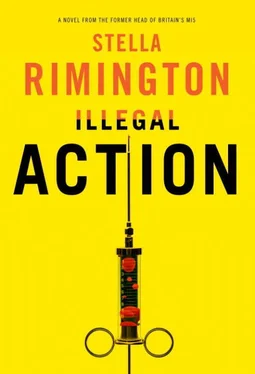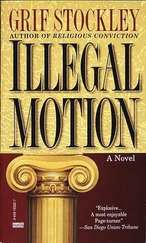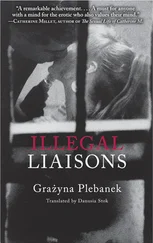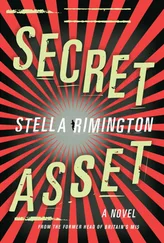At the sight of them Morozov flinched, reflexively holding his arms straight out to his sides. Greta removed the pistol from her bag and pointed it straight at him, saying curtly, “Put your hands down.”
He complied reluctantly, and Dimitri cuffed his wrists. Then he roughly pushed Morozov’s legs together and, kneeling down, snapped the second set around his ankles. He pushed the helpless Morozov on to a sofa and walked out of the room. Brunovsky stared uneasily out the window, scratching his jaw. No one spoke.
After a minute or two Dimitri returned with Svetlana, who was carrying a syringe and a small bottle containing a clear liquid. She filled the syringe with the fluid. Morozov, on the sofa, moaned and squirmed. Svetlana lifted the syringe and inspected it admiringly. Then she moved towards Morozov.
The Russian flinched and tried to struggle to his feet, twisting his body towards Jerry Simmons. “Help me,” he shouted, then seemed to grasp that nothing could or would be done. With an assertive push of one hand, Dimitri shoved him back on to the sofa and, seizing the lapels of Morozov’s jacket, opened them out until the jacket’s shoulders had slid halfway down his prisoner’s arms, encasing him in a home-made straitjacket. Simultaneously, Svetlana leant forward and with one deft move plunged the syringe into the Russian’s biceps, piercing the skin through his shirt. Morozov gave a short hoarse cry, and when Svetlana extracted the syringe, a tiny circle of blood appeared on his shirt, spreading like an ink stain.
“What have you done to me?” he demanded, wincing from the jab.
“Don’t worry,” said Greta. She had relaxed, now that Morozov had been secured. “You won’t even go to sleep.”
Rohypnol, thought Liz. The date-rape drug. Ten times stronger than Valium. They could walk Morozov through passport control, rather than having to carry him, explaining away his stupor as a vodka-fuelled binge. He wouldn’t be able to say much of anything—he’d just nod and smile dozily and before he knew it, he’d be flying at 35,000 feet towards Moscow.
What would happen to him there? A trial, it seemed, though probably little better than a show trial. This one would be designed to show the prying Western media that the Russian state did things the right way. No assassinations, no radiation poisonings, but the punishment meted out would be the same. Death.
Morozov’s eyes were growing glassy; already the drug was working. He said something in Russian and shook his head, fighting against the effects of the injection. Then he tried to say something else, but no sound came out.
Greta turned to Dimitri and gave an order. He and Brunovsky lifted Morozov to his feet and shuffled him out between them. They were going to put him in the car. She turned to Liz and Simmons, silent spectators of the whole drama. “I’m going to put you two in the cellar, along with that old man who answers the door.” Then she added with an unpleasant smirk, “Perhaps later on, Miss Cottingham will let you out.”
Adead squirrel lay flattened on the gravel at the top of the drive, still bleeding. “There’s been a car along here recently,” said Rodrigues, looking in the mirror at Michael in the back seat.
They were approaching the house that loomed at the end of the double row of lime trees, and a tense silence filled the car. Decay in all around I see, thought Michael as they neared, for though the building was an architectural jewel, it was a damaged one—he noted the missing tiles on the roof and the nest which rooks had made on top of one chimney. There was something spooky about the untended beauty of the place.
Michael broke the silence. “Stop here,” he said abruptly, well short of the terminating semicircle of gravel, where they could see two large black limousines parked. Rodrigues grunted and pulled over. As they got out of the car, both he and Maloney unbuttoned the holsters of their side arms.
The day was unseasonably cold, but the wind had died and a stillness hung like mist in the air. No birds sang, no cars hummed in the distance. They walked silently on the grass at the edge of the gravel drive, aware that the lime-tree avenue gave them little cover as they approached the house. Michael was very conscious of being in charge. This was his operation. But what was the best way to proceed? Ring the doorbell and ask for Miss Falconer? Find their own way in? There must be an open window somewhere.
The answer came when the large front door creaked open and a short dark man came out, moving lithely, almost cockily down the steps. Michael recognised Brunovsky at once. He felt relief—if Brunovsky were still here, then Liz must be as well. And there was no sign that the oligarch was in any danger. Far from it—he was waiting for someone, and a moment later a tall, powerfully built figure in a leather jacket came out, supporting an older man, who looked ill.
What’s going on? wondered Michael. Who was this sick man and why was he being helped to the car? Where the hell was Jerry Simmons?
He knew they had to make a move. “Don’t let them drive away,” he instructed Rodrigues. It was then that they were spotted: as the tall man bundled the invalid into the Mercedes, he straightened up and pointed towards them, speaking urgently to Brunovsky.
“Let’s go!” shouted Michael, and Maloney and Rodrigues began to run. By the car, the man in the leather jacket hesitated. For a moment Michael thought he would run for it.
“Garda!” shouted Maloney. Then “Police!”
The man turned to face them and raised his hands in surrender. It was Brunovsky who kept moving, sprinting towards the side of the house.
“Stop,” shouted Maloney, but the Russian kept running. You idiot, thought Michael; didn’t he understand it was the Garda? Michael was also running now, only a few yards behind the Irish policemen, and as he reached the car he decided to leave Brunovsky to it; he would be easy to find in the grounds later on. Right now his priority was Liz, and he stopped and turned to Maloney. “Leave him,” he said, gesturing in the direction of the fleeing Russian. “Come with me.”
They ran up the steps and into the house, where they stopped in the cavernous entrance hall and listened. Silence. Then, very faintly, they heard a slow thumping noise towards the rear of the building. Michael turned to Maloney and put a finger to his lips. “Wait here,” he whispered, “and don’t let anyone leave the house.”
Michael moved cautiously along the corridor until he reached an open door. He peered into a sumptuous but faded drawing room, with a view of gardens and, in the distance, a large oval lake. There was a woman in the corner, struggling with one of the French windows. She was trying to open it, he realised, and when she saw him standing in the doorway, she turned back and pushed hard against the lock.
“Where is Jane Falconer?” he demanded, just as the lock gave way and the French window flew open. Instinctively, Michael stepped forward into the room. “Wait,” he said, fearing the woman was about to run outside. “Don’t move.”
She cast a look back at him, openly scornful, and he took two quick steps towards her. This must be Greta. He still expected her to run for it, and was taken by surprise when she suddenly reached into her bag. The next thing he knew she was holding a gun. She said, with the precision of a foreign speaker, “Do not get involved.”
She’s going to get away, was his initial reaction before he had time to be afraid. “Put it down,” he said self-consciously, wondering where the line had come from. A movie? A thriller? He was amazed how calm he felt. “Don’t be stupid,” he said. “Maloney!” he suddenly shouted. And as he took another step towards her, watching for her to drop the gun, he wondered quite irrationally what Anna would think of him now.
Читать дальше












